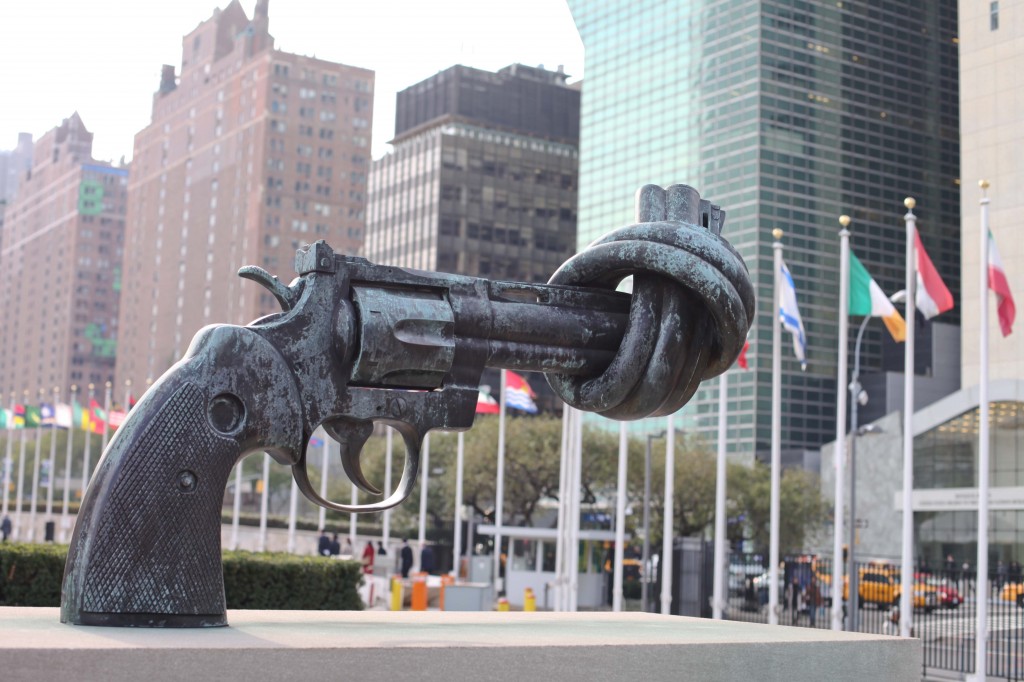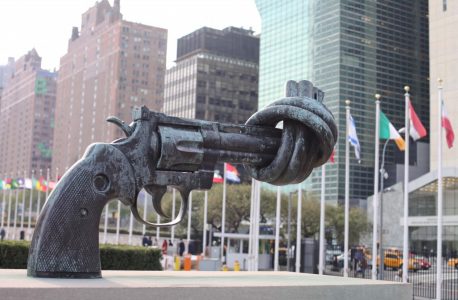Here is MAW’s submission to the UN, sent 15/01/23
“Dear Secretary General
Movement for the Abolition of War (MAW) is grateful for this opportunity to submit our views for the new UN Agenda for Peace.
MAW is a voluntary UK organisation founded in 2001 to challenge popular thinking on the acceptability and inevitability of war and to promote the vision of a world in which conflicts are resolved without resort to violence. We believe that the abolition of war is both desirable and possible. Today there exist better, more civilised, more sustainable ways of resolving conflict than by military means: through the UN and other international institutions, international laws and treaties, and skills of diplomacy together with tried and tested methods of conflict prevention and resolution. What is still needed is the popular will to utilise these resources effectively: a change of mindset – a cultural change, and a recognition of what provides true security.
MAW’s campaign priorities are
• to support and promote the ideals of the UN and to raise awareness of its achievements and potential
• to publicise the contribution to the climate crisis of military-related activity and to call for this to be officially recognised and reduced
• to properly control the arms trade which fans the flames of war
• to demand a revised set of budget priorities where military spending is reduced and environmental issues, public services and inequality programmes are given a far greater share of public resources
• to push for the abolition of nuclear weapons.
We welcomed the UN75 declaration by Member States and applaud your perceptive and imaginative report Our Common Agenda, containing so many observations with which we wholeheartedly agree.
For our submission, we would like to focus on
1. Increasing public awareness of and support for the UN
UN Member States should be encouraged to proactively raise greater awareness and understanding among their populations of the achievements, ideals and potential of the UN in order to strengthen the organisation and increase its effectiveness. To this end, States might, as a first step, consider celebrating UN Day every year as a public holiday.
2. Peaceful resolution of conflicts
UN Member States should be encouraged to subscribe to the compulsory jurisdiction of the International Court of Justice and make better use of the UN Mediation Services to resolve international disputes peacefully rather than through the threat or use of force.
3. Using Common Security to replace the ‘law of force’ with the ‘force of law’
UN Member States should be encouraged to base their national defence, foreign affairs and security policies on common security: a framework which holds that a nation is best secured by using conflict resolution, diplomacy and law to enhance the security of everyone (including oneself and one’s adversaries) rather than by diminishing the security of others by the threat or use of force.
A common security approach would entail increased financial and political investment in peace, diplomacy and international law (including in the United Nations), and cuts in the massive and disproportionate global investments in militaries.
‘Strengthening international foresight and capacities to identify and adapt to new peace and security risks’ referred to in Our Common Agenda is indeed vital.
4. Recognising that peace is vital for environmental sustainability
Paragraph 88 of Our Common Agenda notes that ‘Climate change is contributing to instability and is affecting livelihoods, access to resources and human mobility trends’.
UN Member States should also recognise that military-related activity and conflict do themselves contribute significantly to the climate crisis but there is as yet no obligation on States to make full declarations of the resulting greenhouse gas emissions, nor to include them in their national reduction targets. The climate emergency is too serious to pick and choose – all pollution must be counted with no exceptions for military-related emissions, no reliance on offsetting schemes, and a requirement for independent verification.
The climate crisis and the COVID-19 pandemic have shown more clearly than ever that true security depends on human and planetary well-being and international co-operation rather than on military might. Peace, justice and environmental integrity are inextricably linked.
5. Protecting the global commons through re-purposing the UN Trusteeship Council
Nations, and humanity as a whole, face serious threats to security from erosion of the global commons, ie ecosystems that are shared by all and not owned by anyone. These include the atmosphere (climate), oceans, outer space, sea-bed, Antarctica and cyberspace. Global commons require global governance in order to protect them from plunder and destruction by national or corporate interest. As proposed in Our Common Agenda, the UN Trusteeship Council could be repurposed to provide an appropriate place for UN Member States and civil society to build such global governance for the global commons. The 2024 Summit of the Future could initiate this process.
6. Implementing nuclear disarmament obligations
UN Member States should be encouraged to set a time-frame for the global elimination of nuclear weapons (as required by international law) to be achieved as soon as possible but certainly no later than 2045, the 100th anniversary of the United Nations. This could be affirmed by UN General Assembly resolution, the 2024 UN Summit of the Future and/or the 2025 Non-Proliferation Treaty Review Conference.
We send our thanks and all good wishes for your vital work
Hilary Evans
Vice-Chair, Movement for the Abolition of War



